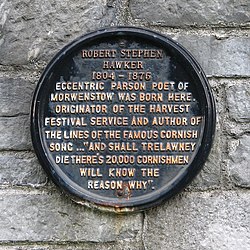The Song of the Western Men
| English: The Song of the Western Men | |
|---|---|

Plaque commemorating R. S. Hawker at Charles Church, Plymouth.
|
|
|
Regional anthem of Cornwall |
|
| Lyrics | Robert Stephen Hawker, 1824 |
| Music | Robert Stephen Hawker, 1824 |
"The Song of the Western Men", also known as "Trelawny", is a Cornish patriotic song, written in its modern form by Robert Stephen Hawker in 1824, but having roots in older folk songs.
Hawker, a churchman, assumed that the Trelawny mentioned in the song was Sir Jonathan Trelawny, the Bishop of Bristol, who had been imprisoned in the Tower of London by King James II in 1688. However it is more likely that it referred to his grandfather, Sir John Trelawny, a Cornish Royalist leader who had been imprisoned by parliament in 1628.
According to Cornish historian Robert Morton Nance, "The Song of the Western Men" was possibly inspired by the song "Come, all ye jolly tinner boys" which was written more than ten years earlier in about 1807, when Napoleon Bonaparte made threats that would affect trade in Cornwall at the time of the invasion of Poland. Ye jolly tinner boys contains the line "Why forty thousand Cornish boys shall knawa the reason why."
The song has become one of the unofficial anthems of Cornwall and is a regular favourite sung at Cornish rugby union matches and other Cornish gatherings. In some schools in Cornwall, the children are taught the first verse and chorus, and sing it at events such as Murdoch Day and St Piran's Day.
However, the people of Cornwall did not march to rescue Trelawny, as told in the song. He was imprisoned in the Tower of London for three weeks, then tried and acquitted.
Trelawny Lyrics
A good sword and a trusty hand!
A merry heart and true!
King James's men shall understand
What Cornish lads can do!
And have they fixed the where and when?
And shall Trelawny die?
Here's twenty thousand Cornish men
Will know the reason why!
...
Wikipedia
